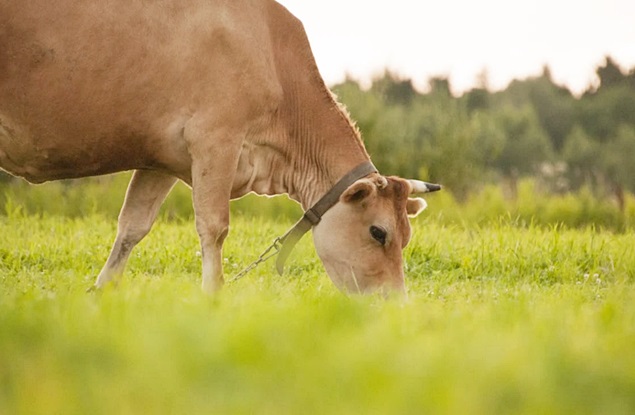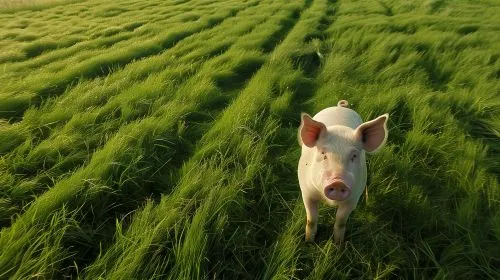955

Olive-Derived Triterpenes May Significantly Reduce Methane Emissions in Livestock Farming, Study Finds
According to a study cited by AgTechNavigator, triterpenic compounds extracted from olives exhibit an exceptionally high global warming potential — approximately 25 times greater than carbon dioxide — making them a short-term but impactful climate factor.
Triterpenes and Their Climatic Impact
Due to their strong heat-trapping properties, triterpenes contribute significantly to short-term global warming, potentially exacerbating extreme weather events, glacier melting, sea-level rise, and disruption of ecosystems and agriculture.
This finding aligns with broader concerns addressed by international frameworks such as the Paris Agreement, which aims to mitigate short-lived climate pollutants (SLCPs) like methane in order to limit global temperature rise to well below 2°C.
Methane Emissions: Agriculture and Energy in the Spotlight
Globally, the livestock sector is one of the primary contributors to methane emissions, particularly through enteric fermentation in ruminants (cattle, sheep, goats). In parallel, the oil and gas industry also plays a major role through leakage and inefficiencies.
Methane has a short atmospheric lifespan of around 12 years, making reductions highly impactful in the near term. As such, both the feed industry and energy sector are under growing pressure to adopt mitigation technologies and strategies.
How Ruminants Produce Methane
During enteric fermentation, rumen microbes break down ingested feed into volatile fatty acids like acetate and propionate, which provide essential energy to ruminants. A by-product of this process is methane (CH₄), generated primarily by methanogenic archaea using hydrogen (H₂) and CO₂.
The amount of methane produced depends heavily on diet composition. For example, diets that promote propionate production over acetate reduce hydrogen availability for methane synthesis—thus lowering methane emissions while improving energy efficiency.
A Promising Role for Plant-Based Feed Additives
Several mitigation strategies have emerged, including feed additives, dietary reformulation, and the use of plant-based bioactives. One area of growing interest involves secondary plant metabolites—notably triterpenes—with antimicrobial properties that may beneficially modulate the rumen microbiome.
Olive Triterpenes and Ruminal Fermentation: A New In Vitro Study
A team including Natac researchers conducted an in vitro study to assess the potential of olive-derived triterpenes (Olea europaea L.) in modulating rumen fermentation.
Key Experimental Findings:
- Acid oleanolic, a major olive triterpene, was tested in varying concentrations (up to 100 mg/L and 200 mg/L).
- Control groups included 0 mg/L (negative) and 4 mg/L sodium monensin (positive).
- Rumen fluid was collected from four crossbred cows fed two distinct diets: high-fiber forage and highly fermentable by-products.
Results:
- Oleanolic acid significantly reduced gas and methane production.
- The acetate-to-propionate ratio shifted, favoring propionate formation.
- This shift lowered hydrogen availability, thereby limiting methane synthesis.
- Effects were comparable to those of monensin, an antibiotic commonly used in feed.
Implications for Climate and Livestock Sustainability
The findings suggest that bioavailable olive triterpenes may offer a natural, non-antibiotic alternative for methane mitigation—an important contribution toward meeting climate goals under the Paris Agreement.
By improving rumen fermentation efficiency and reducing CH₄ emissions, these compounds could enhance the environmental profile of animal agriculture.
Improved Animal Welfare and Productivity
Such feed strategies are also aligned with enhancing animal welfare, as lower digestive stress and better feed conversion may translate to healthier, more resilient animals that require fewer medical interventions.
Healthier animals contribute to lower environmental impact per unit of output, whether meat or dairy.
A Path Toward Climate-Smart Livestock Farming
As global demand for animal-based products continues to rise, solutions that balance productivity, sustainability, and ethical responsibility will be crucial in shaping the future of agriculture.
Triterpenes, such as those derived from olives, may represent one such multifaceted solution—addressing emissions, animal health, and consumer concerns simultaneously.
(Photo: Pexels)





